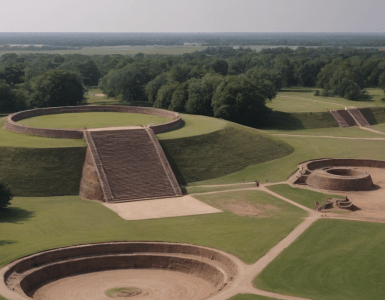La leyenda de la Atlántida, una isla mítica descrita por el antiguo filósofo griego Platón, ha cautivado la imaginación durante siglos. Según Platón, la Atlántida era una civilización poderosa y tecnológicamente avanzada que desapareció en el océano en un solo día y una noche de infortunio. Aunque su existencia sigue sin demostrarse, la historia continúa inspirando a exploradores e historiadores por igual.
1 comentario
También le puede interesar
The Unexpected Tapestry: How History’s Quirks Woke Up Culture
The Unexpected Tapestry: How History’s Quirks Woke Up Culture History isn’t just dusty old textbooks and stuffy museums. It’s a gloriously messy, hilarious, and often bizarre chain of events that shaped the cultures we know and love (or maybe tolerate… let’s be honest, some cultural quirks are… unique). Dig a little deeper, and you’ll uncover surprising connections between seemingly unrelated historical events and their lingering effects on our traditions, customs, and even our language. Prepare for a whirlwind tour through time, where potatoes trigger wars, a fishy sauce dictates Roman power, and cats become symbols of good luck (mostly). The Great Potato Famine and the Rise of Irish Dance Most people link the Irish Potato Famine (1845-1849) to mass starvation and emigration. But the devastation also indirectly contributed to the global popularity of Irish step dancing. With widespread poverty and a lack of work, many Irish people turned to performing arts as...
History’s Hidden Handshakes: Unexpected Cultural Connections You Never Knew Existed
History’s Hidden Handshakes: Unexpected Cultural Connections You Never Knew Existed Ever wondered why we do the things we do? Why certain traditions persist, seemingly out of nowhere? History, it turns out, is a mischievous pup, leaving its paw prints all over our culture in the most unexpected ways. Forget grand narratives; let’s dive into the weird, wonderful, and downright bizarre links between historical events and the cultural practices we take for granted. The Curious Case of the Fork: From Fancy to Familiar Forks. We use them every day, right? Seemingly mundane. But their journey to our dinner tables is anything but. For centuries, the fork was considered a ridiculously pretentious invention, a symbol of outlandish wealth and foreign fads. Imagine the medieval dinner scene – fingers were the norm! The fork’s ascent to everyday utensil status is a fascinating example of how a seemingly insignificant object reflects broader social and technological shifts. The...
La metrópolis olvidada de América
Nestled in the heart of the American Midwest, just across the Mississippi River from modern-day St. Louis, lies the remnants of a vast Native American city that once rivaled the great urban centers of Europe. Cahokia, at its peak around 1100 CE, was the largest pre-Columbian settlement north of Mexico, home to an estimated 20,000 people. This sophisticated metropolis, with its massive earthen mounds, intricate social structure, and far-reaching trade networks, flourished for centuries before mysteriously declining and eventually being abandoned. Despite its historical significance, Cahokia remains largely unknown to many Americans, overshadowed by later European settlements. The story of this lost city challenges our perceptions of pre-Columbian North America and offers valuable insights into the complex societies that existed long before European contact. The rise of Cahokia represents a pivotal moment in North American history, marking the transition from small, scattered...
























Ne garummuş kardeş, aydınlanma yaşadım !:)
¿Qué es lo que más le gusta?